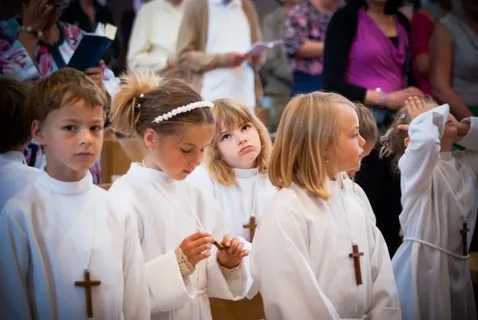Definition of Christian Religious Education
If you’re pondering what Christian Religious Education means, you’re not on your own. Many have this question as the term sounds very formal, but in reality, it’s something we’ve all been through without realizing that it was happening. What’s the issue about Christian Religious Education?
Let’s take it apart. No matter if you’re a parent, student, or simply interested, I’ll describe the basics, as if we were having a conversation over a cup of coffee. At the end of this, you’ll be armed with an idea regarding the nature of Christian Religious education, the reasons why it’s so important and how it’s carried out in schools.
Outline
- What is Christian Religious Education?
- Simple definition
- The purpose and importance
- How Christian Religious Education is Taught
- Methods and methods
- Common topics discussed
- Why Christian Religious Education Matters
- Moral development
- Stories and examples from personal experiences
- Challenges in Christian Religious Education
- Modern issues and faith.
- Discussion of diverse beliefs in a classroom
- FAQ on Christian Religious Education
- Conclusion
What is Christian Religious Education?

A term “CRE” in the sense of Christian Religious Education (CRE) is easy to understand: It’s the process of teaching of and learning about the practices, beliefs, and principles of Christianity. It’s intended to help students comprehend the Christian faith; however, it also enables students to consider big questions, such as the meaning of morality, life, and spirituality.
Simple Definition
At its heart, CRE is about exploring the Bible and the principles of Jesus as well as Christian practices. It’s not about memorizing the facts of religion, but more about knowing how these beliefs are applicable to our lives today.
For instance:
- Learning About the Life of Jesus Jesus: Who He was and what He taught, and the reason He is important.
- understanding Christian values love and kindness, forgiveness and how they play an important role in our lives.
- Engaging with moral dilemmas What does Christianity tell us about morality?
Classes in CRE are a mixture of stories, discussions and sometimes debates. It’s not just about being in a classroom; it’s about pursuing faith in a manner that feels relevant.
Purpose and Importance
The aim for Christian Religious Education is to benefit students:
- Develop spiritually It is a way to encourage users to think about their personal beliefs and the ways in which Christianity can influence their lives.
- Learn about Christianity even if students do not identify, as Christian CRE provides them with an understanding of any of the main religions.
- Develop moral character It usually focuses on the values of respect, kindness and responsibility. These are crucial for all students, irrespective of their background.
How Christian Religious Education is Taught
The teaching of Christian Religious Education isn’t just about opening the Bible and reciting it. It’s more engaging and often customized to meet the needs of modern students.
Methods and Approaches
Here’s what Christian Religious Education typically looks in the classroom:
- Storytelling Teachers usually use story that come from the Bible in a manner that is more relatable. Imagine it as parables, simple stories that teach deep lessons.
- Discussions Students are urged to engage in discussions and ask questions, as well as share their ideas. This helps make learning more enjoyable and personal. learning experience more enjoyable and personal.
- Activities Some lessons incorporate activities such as writing, drawing or even reenacting scenarios from the Bible and help students understand the material by engaging in hands-on ways.
Common Topics Covered

The curriculum for Christian Religious Education could include:
- Jesus’ life Jesus and His doctrines
- Significant Biblical people: Moses, David, Paul, and others
- Christian celebrations, including Easter, Christmas and various other religious holidays
- Christian principles for forgiveness, love, humility and serving other people
These lessons don’t only focus on the past but also how students can implement these values to their lives.
Why Christian Religious Education Matters
What is the reason Christian Religious Education matters? It’s more than simply educate students about Christianity; It helps them define who they are as individuals.
Impact on Values and Moral Development
One of the greatest advantages of CRE is the emphasis on values. In a time when it’s easy to become caught up in distractions, CRE helps students with moral guidance. CRE encourages students to:
- Be compassionate and kind By following Christ’s example, Jesus students are taught to take care of others.
- Consider their actions Which actions would Jesus take? This question can guide students in making the right choices.
As a child, I remember attending CRE classes in which we discussed forgiveness. At first, I was unsure about the concept of forgiveness. Why should I be able to forgive someone who has hurt me? However, over time, I realized that holding on to anger didn’t benefit me. Moreover, learning to forgive helped me feel more relaxed. Little lessons like that can have a huge impact on children.
Personal Stories and Examples
I had a conversation with a student who was quiet and was not very vocal in the class, but when we talked about topics such as charity and helping others, she told stories of how she helped her friends. CRE allowed her to tell these stories and to connect with other people at a deeper level.
They’re not just classroom exercises; they’re teachings for the whole real world. This is the value of Christian religious education.
Challenges in Christian Religious Education
As important in its value Christian Religious Education is, it’s not without challenges. Our world today is more complex and diverse than ever, so CRE must adapt to meet the demands of students from every sphere of life.
Balancing Faith and Modern Issues
Christian religious education doesn’t happen in the absence of. Students today are confronting issues that were not even in the past, such as the internet, mental health, or climate change. CRE needs to be relevant, allowing students to see the ways in which Christian doctrines can be applied to the current challenges.
Addressing Different Beliefs in a Classroom
One of the challenges CRE has to face is that many students are not Christians. Many may be from other religions, or none whatsoever. Teachers must be aware of this and ensure the CRE program is inclusive and encourages discussion while respecting the beliefs of all people.
FAQ on Christian Religious Education
What Is the Purpose of Christian Religious Education?
The aim and purpose of Christian religious education is to inform students about Christianity’s values, beliefs, and customs while aiding them in developing an ethical sense of. It’s more than knowing; it’s about helping students to live a lifestyle based on respect, kindness, and a sense of the ability to think.
Is Christian religious education only for Christians?
No. Although CRE is a center of Christian principles, it can help students of any faith (or none whatsoever) by teaching principles like forgiveness, kindness, and love.
How Can Christian Religious Education Stay Relevant in Today’s World?
Through tackling contemporary issues with the Christian lens and encouraging discussions on how values and faith can be applied to current issues, CRE continues to be relevant and useful for students of today.
Conclusion
Its concept of Christian Religious Education is more than a collection of lessons in religion. It’s a method to benefit students in understanding their own values and where they fit on the planet. Through the teaching of forgiveness, kindness, and morality through the lenses of Christianity, CRE gives students an instruction not only for school but also for the rest of their lives.
If you’re anything just like me, you’ll be able to remember these lessons long after you’ve finished school. These are the kind of lessons that stay with you, helping to navigate the highs and lows of life with more clarity and more passion.




